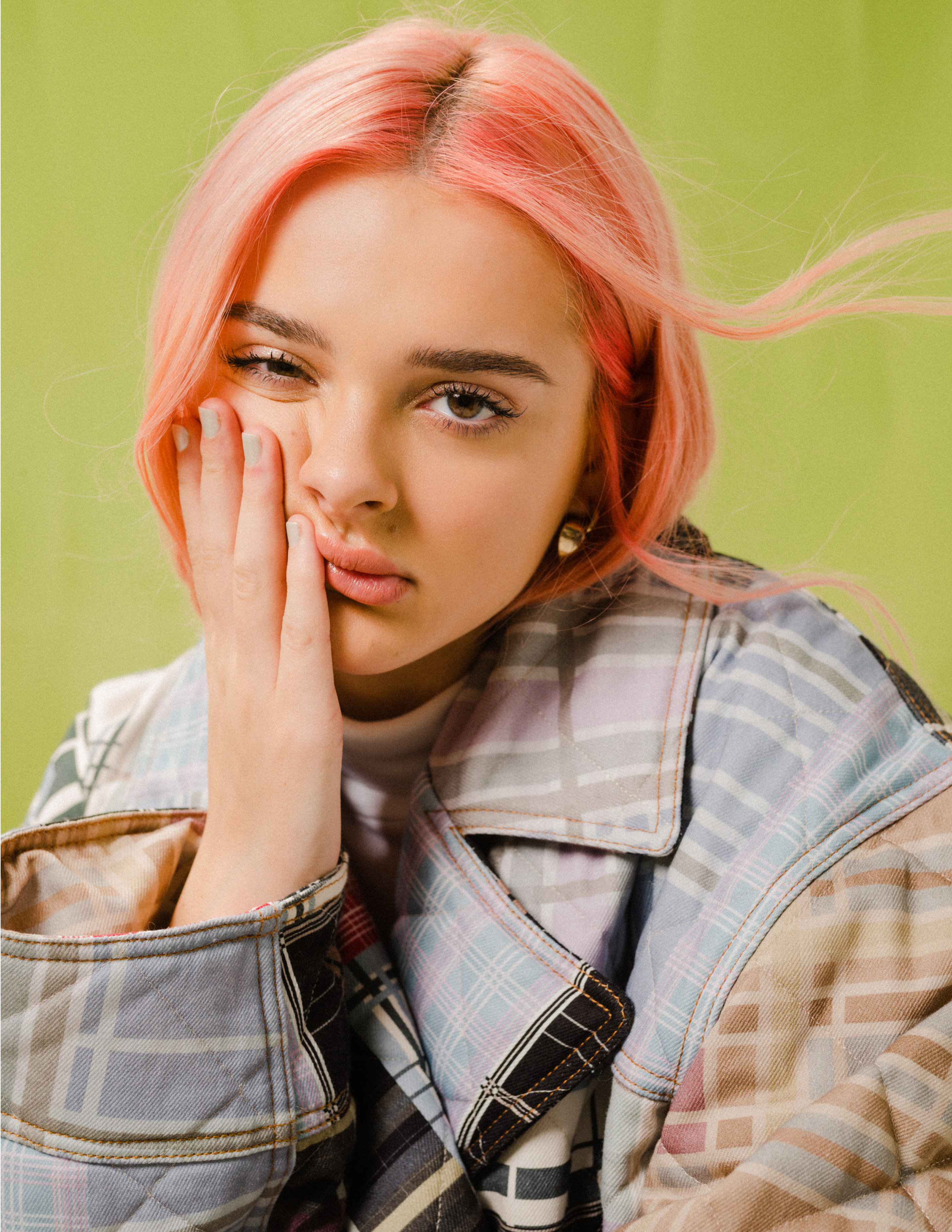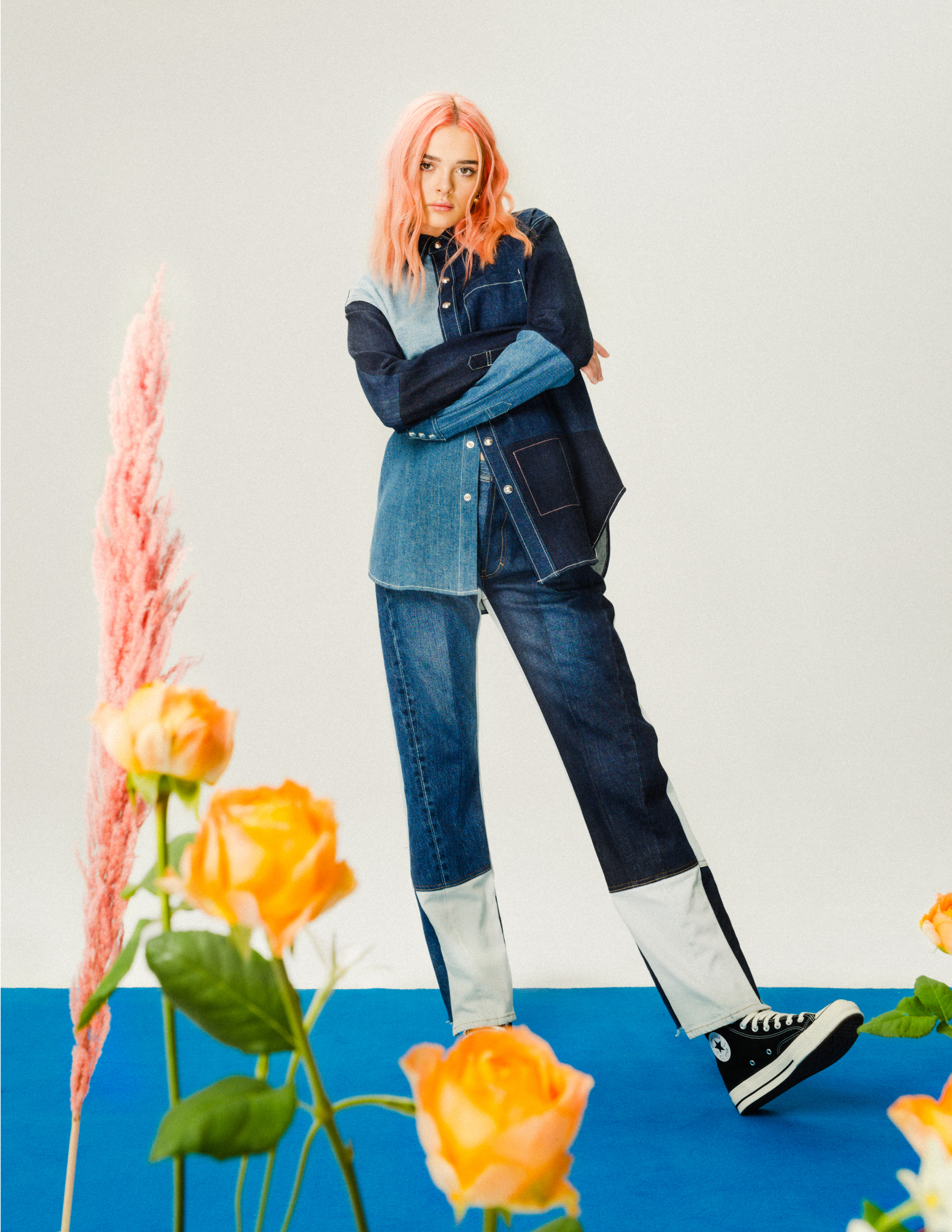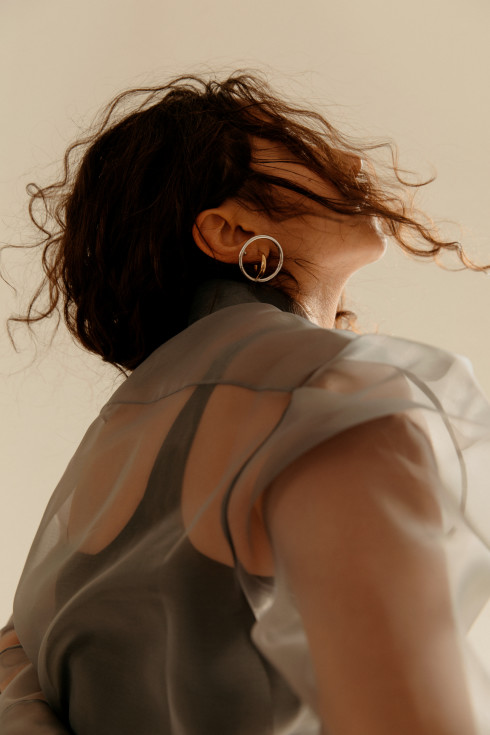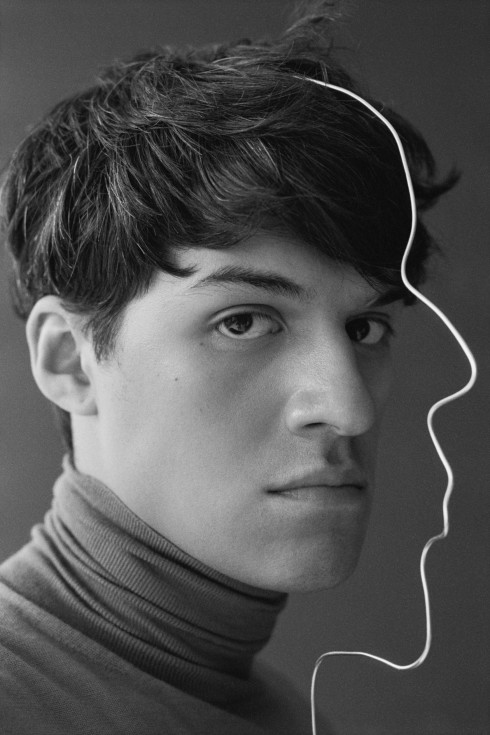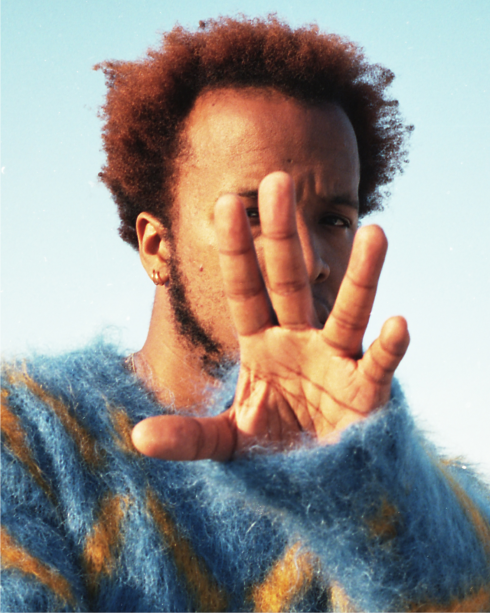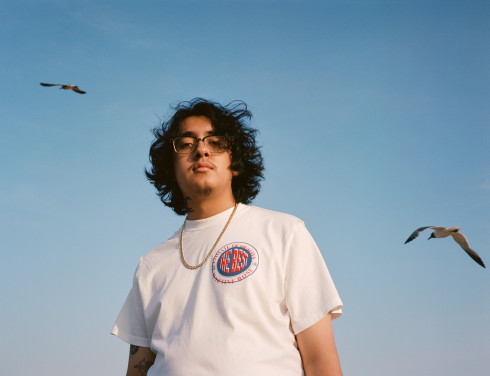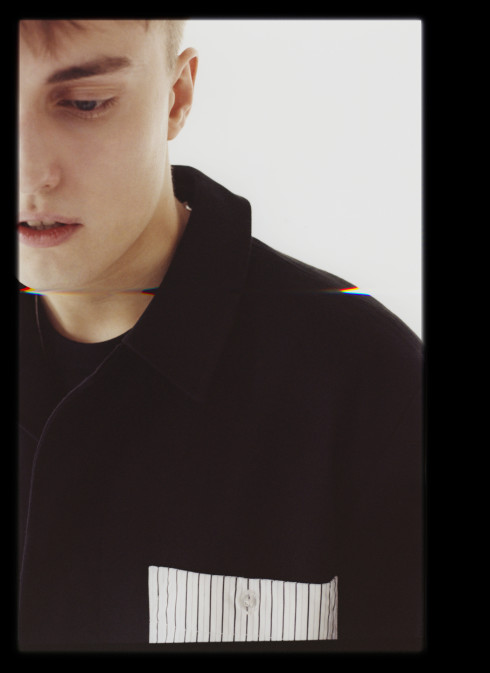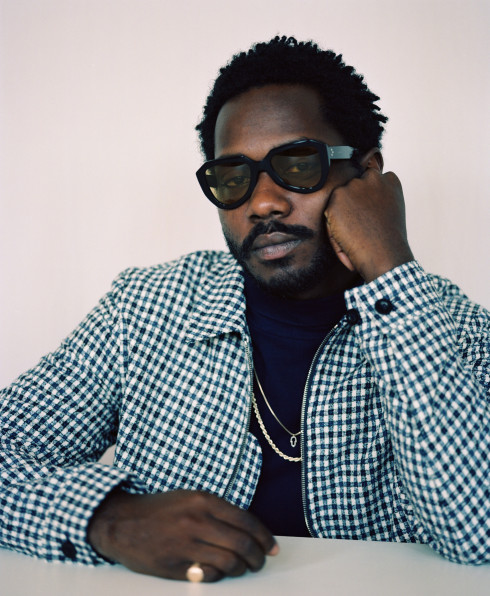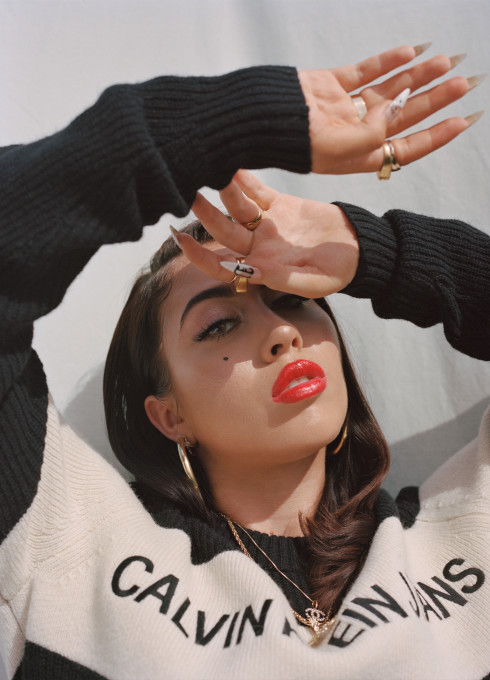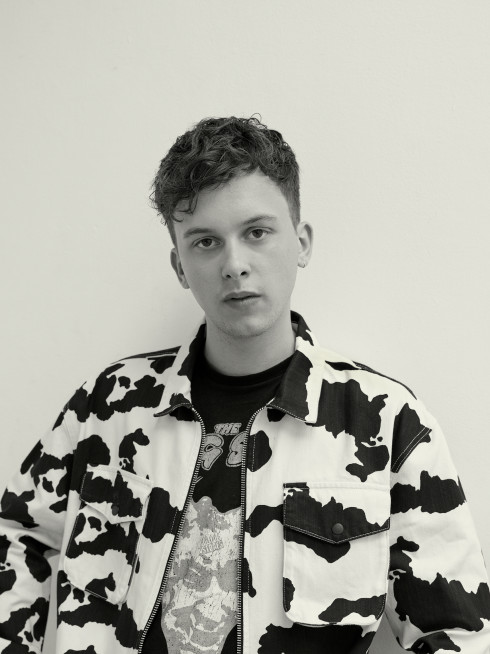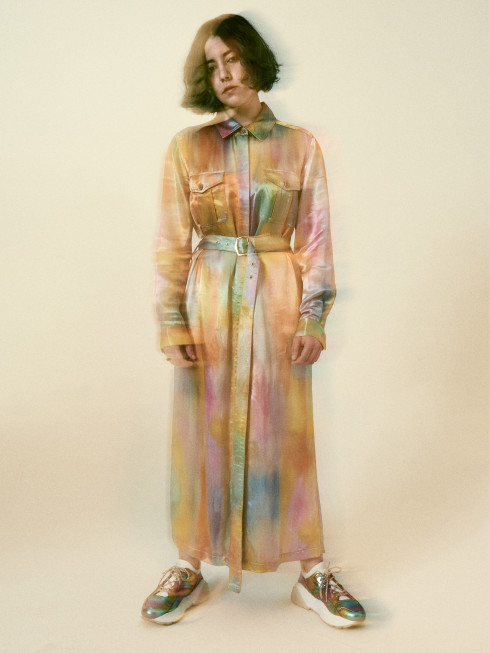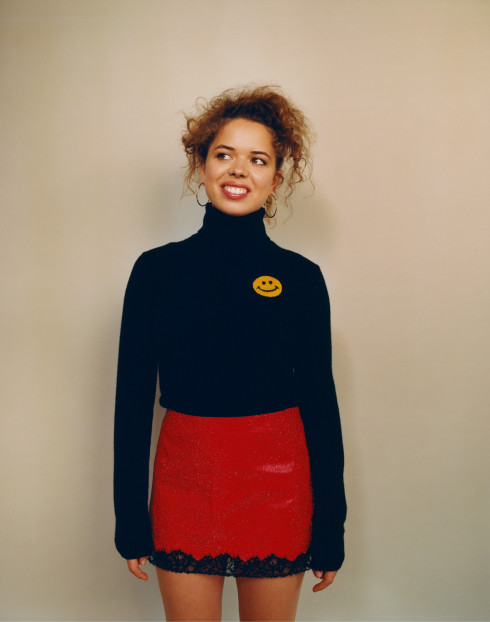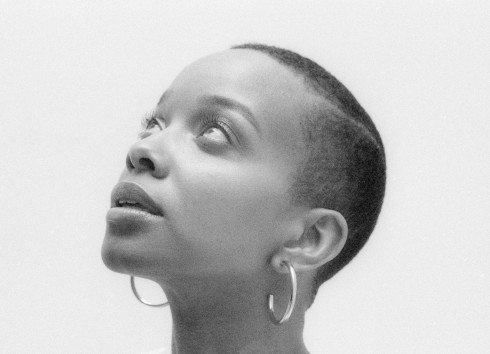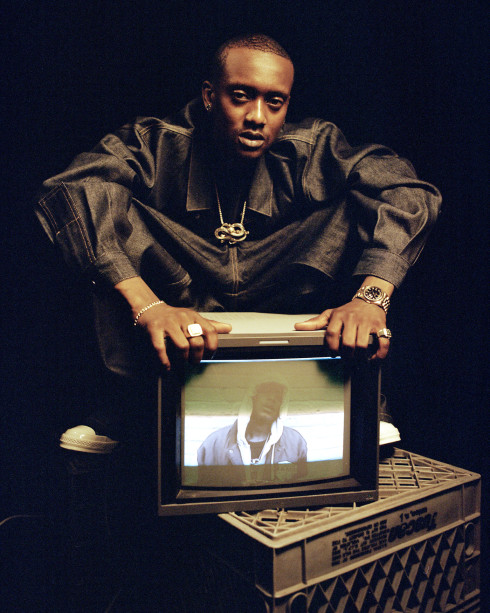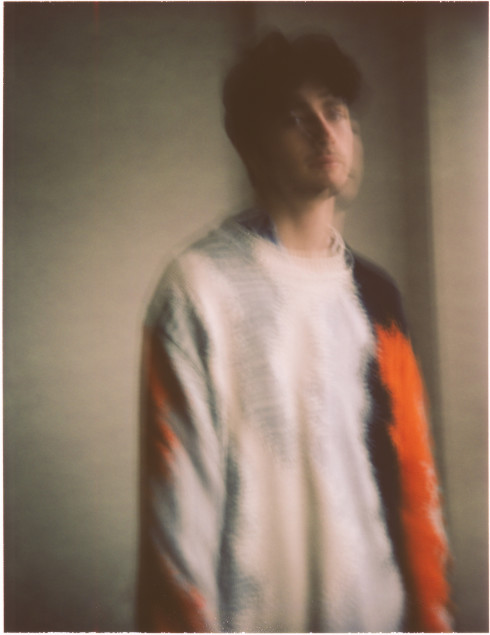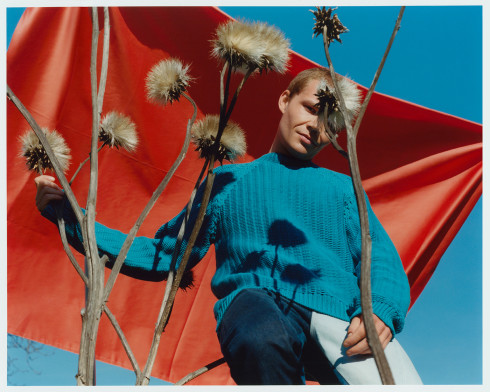
Sweater by Lorod. All earrings throughout by Laura Lombardi.
- By
- Stephanie Fuchs
- Photography by
- Ryan Lowry
- Styling by
- Jessi Frederick
Hair by Clara Leonard at The Wall Group. Makeup by Tobi Henney at The Wall Group using Chanel Beauté. Manicure by Isadora Rios. Set design by Margaret MacMillan Jones. Photographer’s assistant: Graham Austin. Stylist’s assistant: Louisiana Mei Gelpi. Shot at Slate Studios, New York.
Charlotte Lawrence Teaches the Value of Vulnerability
The big emotions that come with being vulnerable are often overwhelming, but singer-songwriter Charlotte Lawrence invites her listeners to feel without judgment, all while maintaining a dash of lightheartedness. Her tender-yet-harsh lyrics contrast perfectly with the upbeat pop melodies that make her audience want to cry, sing, and dance all at the same time. At first glance, Lawrence’s musical prowess is surprising, as she comes from a family with no musical background. Growing up in Los Angeles with her parents, producer Bill Lawrence and actor Christa Miller, Lawrence was surrounded by people who worked in television, both behind and in front of the camera. Her father’s love of writing and her mom’s impeccable taste in music are what ultimately nurtured Lawrence’s passion for singing. “I grew up just writing on my bed with my guitar or on my piano, and I loved it,” she explains. “I’ve written some of my favorite songs like that.” Music was just a fun pastime until the age of thirteen, when, unbeknownst to Lawrence, her passion would become a career. After hearing her sing for the first time, friends and Snow Patrol members Gary Lightbody and Johnny McDaid pulled her into the studio, where she recorded a cover of Bon Iver’s “Skinny Love,” changing how she saw music forever.
Bon Iver still plays a monumental part in Lawrence’s career as one of her biggest influences of all time. Their albums never fail to take the nineteen-year-old on an emotional journey, which is something she hopes to achieve through her own music. “Justin Vernon, who writes everything, is the most incredible songwriter,” Lawerence gushes. “He can either tell a story and you understand every word of it or he can put words together that make you feel something—even if you were to write them out on a piece of paper and couldn’t understand what he was trying to say. I think that’s so special.” Similarly, Lawrence herself enchants audiences with brutally honest lyrics that invigorate the heart and an ever-changing sound that applauds personal growth.
Along with her 2018 EP Young, Lawrence’s discography includes an array of powerhouse pop singles that she refers to as emotional time capsules. Songs like “Sleep Talking” and “Just the Same” disguise the “mean, self-hating, or sad” lyrics that accompany the infectious dance melodies. Music has always had a therapeutic effect on the Lawrence and the studio acts as a sanctuary, allowing her to manifest her pain into art. The emotional labor it takes to complete a song from start to finish is both liberating and rewarding, as the end result is a piece of herself that others can relate to and find comfort in. Lawrence explains that if she receives even one long message of “your song helped me through this” or “you took the words out of my mouth,” it’s all worth it. “I’ve never really felt that fear of, ‘Oh is this too vulnerable? Is this too much to share?’” she offers. “I know what I feel and I know that I’m not alone, so why not sing about it?”
Her latest single, “God Must Be Doing Cocaine,” is no exception, taking a raw, unfiltered look at Lawrence’s upbringing in Los Angeles. Its haunting melody immediately induces goosebumps that only increase in intensity as the psychedelic chords ring loud alongside her soft voice. Heavy with the loss of innocence, Lawrence sorrowfully sings about her surroundings and what she wishes wasn’t there. “I think the world is fucked up, but we experience every single day without even noticing it,” she explains. “When you walk down the street, everybody has their head in their phones, all looking the same with their altered faces and huge lips. And, to get a little darker yet, there’s school shootings like every fucking day in America! It’s so frightening and scary.” Despite her despondency and anger, Lawrence did not want her view of the world to come off as preachy or to speak for anybody but herself. Rather, she hoped to share a layered experience that may, in one way or another, reflect the lived truths of all different kinds of people. Unlike her other singles, “God Must Be Doing Cocaine” is a one-of-a-kind song that is very special to Lawrence. The maturity of the lyrics and production emulates her growth as a musician, offering only a small hint of what’s to come.
Artistically, Lawrence finds that she is currently in a transition period where she is ready to move away from singles to work on larger projects, despite her fondness for past one-offs such as “Navy Blue” and “Why Do You Love Me,” both of which highlight how intoxicating a bad relationship can be with sparse instrumentals and bold, fiery beats. “I think releasing singles is fun because you can say a lot in one song and it doesn’t have to be this huge story,” she explains. “It’s kind of cool to just release something spontaneously and feel more casual towards it.” However, as she begins to feel more comfortable in her skin, Lawrence is at work on an album that conveys her newfound confidence and personal growth. “I feel like an artist should grow with their music and match how they’re living their life in the real world.” She reflects, “I’ve noticed that some of the music I used to make, while so fun to perform, isn’t the music I love to listen to. I finally feel like I’m making music that, if it weren’t me as an artist, I would listen to the song and fucking love it.” Lawrence’s admirable ability to redefine what authenticity means to her is what makes each release more exciting than the last. No matter how her songs differ from track to track, they never lose their heart. For Lawrence, an album means sharing a deeper, more introspective experience with her audience, which she hopes will bring her even closer to her fans.
Creating songs that promote emotional vulnerability about heartbreak, anxiety, and societal disconnect has greatly influenced the relationship between Lawrence and her listeners, establishing an unusual sense of closeness that has become a point of pride for the singer. “I never want to look at them as just ‘fans,’ because I’m a fucking fan of the Rolling Stones, but you don’t see me sitting and talking to Mick Jagger, wanting to know about his personal life.” She laughs, continuing warmly, “I love the people that listen to my music and I love that I can say that they’re my family and friends. I would be nothing and nowhere without them.” At meet-and-greets, Lawrence’s tour manager often scolds her for going way over the time limit, because she is just as dedicated to her fans as they are to her. It is this undeniable reach that not only continues to sell out her shows but has also cultivated over seven hundred thousand passionate followers on Instagram, an outlet where she can maintain a connection with her audience when chatting face-to-face is not an option.
However, navigating the online space can be tricky for Lawrence because of her distaste for what she calls the “fakeness of it all,” acknowledging that she sometimes falls into this trap herself. “If there’s a great picture of me, I’m going to post it—even if I’m in a rut or sad about something and it makes me look like I’m doing great and happy,” she admits. To combat this bad habit, she tries to utilize the online space to inspire sincere interactions with her audience. “Being able to connect with my fans is fucking amazing,” she adds. “It’s so lucky and rare because that never used to be a thing and people can just talk to anybody now, which is cool in a sense.” Lawrence’s awareness about the pros and cons of social media, and her ability to find a balance between the two, only underscores her authenticity. By being open about her struggles with online culture, she encourages her audience to embrace themselves for who they are and not who they “should” be.
This mantra of being comfortable and confident in one’s skin is Lawrence’s number-one advice to aspiring young artists. “Don’t feel afraid to be authentic with your lyrics, your performances, your voice, your instruments. No matter what your skill is, you can’t be afraid to be real,” Lawrence stresses. “I think people that aren’t real don’t actually want to be there and are in it for the wrong reasons. They aren’t happy people no matter how successful they are.” Still, she emphasizes that hard work has to go along with self-acceptance for artists to really elevate their craft. To find success in the music industry takes some talent, a little bit of luck, and an unshakeable sense of dedication. “Manifest that shit!” she says passionately. “Tell yourself, ‘I’m going to be the biggest in the fucking world!’ And work, work, work, work!” A prime example of this determination is Lizzo, who is a huge inspiration for Lawrence. Before Lizzo became a huge sensation, she worked at her music for over a decade and toured for eight, consistently releasing songs the entire time. “Truth Hurts” only became a number-one hit this summer two years after it had been released. “This stuff takes time and if you work your ass off and are really passionate about what you’re doing, it will pay off.”
Unapologetically real, Lawrence is a force to be reckoned with. She demands vulnerability and, like the moon, can pull the tides of her listeners’ hearts, giving them room to feel pain, anger, sadness, or all of the above. Still, she never leads anyone astray, bringing a sense of comfort and connection through her empowering lyrics and soothing melodies. It is her ability to accept change with an open mind and an eagerness to learn that keeps Lawrence so authentic. With each new release, she continues to surprise, captivate, and leave her audience wanting more, demonstrating the power of radical honesty and openness. So as long as humans have a heart, the need for vulnerability will always be present and Lawrence will always be sure to deliver.
“God Must Be Doing Cocaine” is out now.
- By
- Stephanie Fuchs
- Photography by
- Ryan Lowry
- Styling by
- Jessi Frederick
Hair by Clara Leonard at The Wall Group. Makeup by Tobi Henney at The Wall Group using Chanel Beauté. Manicure by Isadora Rios. Set design by Margaret MacMillan Jones. Photographer’s assistant: Graham Austin. Stylist’s assistant: Louisiana Mei Gelpi. Shot at Slate Studios, New York.
